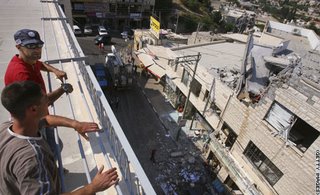I recently heard Rav Aaron Lopiansky from the Yeshiva of Greater Washington suggest the following analogy.
Imagine a couple who have been married for a few years and are not getting along. They consider divorce, but decide to stay together for the sake of the children. But in order to get along, they draw up a contract, complete with attorneys on each side, to guide their relationship. The contract says all of the obligations and rights of each person: he’ll do the shopping, she’ll do the cooking, he’ll clean the gutters, she’ll sweep the deck, he’ll drive to piano lessons, she’ll drive to Little League....
Sound like a good plan? It should avoid most arguments, right?
Sound like any marriages that you know?
But how long could you live in such a relationship before becoming totally depressed? What is missing here?
What’s obviously missing is affection. Agreements and wedding vows are not enough to make a marriage – or any human relationship for that matter. Agreements are perhaps a starting point. They get us off the ground. But to really soar in a relationship, we want to get to the point where our hearts and minds become so close to the other person that we no longer need the contract – I need to get myself to the point where my beloved’s interest is my interest.
How do I do that? Through acts of affection.
For your table: What are the best acts of affection a person can do for another?
+ + +
Below is a picture of 8 Jews who gave their lives for their people this week.

Forget about the geopoltical situation, forget about the morality for a moment. These are 6 Jews who gave their lives for their people There are many more, and still more who find themselves in mortal danger.
What can we do to help?
1. Support the wounded. Here are some links:
http://www.onefamilyfund.org/
http://www.25waystohelpisrael.com/pages/t1.asp?PID=1023
http://www.ou.org/israel/
2. The Bostoner Rebbe, Rav Simcha Cook and other rabbis have called upon the world-wide Jewish community – men, women, adult and youth, to accept the name of a solider or civilian who finds him or herself in danger, and to bond your heart and mind to that person, to offer your good deeds and prayers every day in that person’s merit. If you wish to spiritually partner with a Jew in Israel, please send an email to maortlmo@bezeqint.net or phone to Israel 011-972-2-581-1911. If you know someone who is in danger and needs such a partner, please send their name in as well.
(Alternate USA contacts: 212-929-1525 x100 or execvp@youngisrael.org)
3. Read Psalm 83 once a day. This was selected many months ago to be read in synagogues worldwide. After you read it, you may find this story from the New York Times more meaningful, and may find it generates some interesting Table Talk.
July 27, 2006
Book Buried in Irish Bog Is Called a Major Find
By ALAN COWELL / New York Times
LONDON, July 26 — Ireland’s National Museum said on Wednesday that a 1,200-year-old Book of Psalms found last week by a construction worker in a bog was so archaeologically significant that it could be called an “Irish equivalent to the Dead Sea Scrolls.”
Museum officials said it was remarkable both that the psalter had survived for so long in boggy terrain and that a construction worker had spotted it and halted a mechanical digger just in time to save it from destruction.
“In my wildest hopes, I could only have dreamed of a discovery as fragile and rare as this,” Patrick F. Wallace, the director of the National Museum in Dublin, said in a statement. “It testifies to the incredible richness of the early Christian civilization of this island.”
Aoife Demel, a spokeswoman for the museum, said in a telephone interview that several experts had examined the text and that there was no possibility that it was a hoax.
The museum said in a news release that “in discovery terms this Irish equivalent to the Dead Sea Scrolls is being hailed by the museum’s experts as the greatest find ever from a European bog.” The museum said it could not determine how the manuscript ended up in the bog. “It may have been lost in transit or dumped after a raid, possibly more than a thousand to twelve hundred years ago,” the news release said. Bernard Meehan, a manuscript expert at Trinity College, Dublin, said this was the first discovery of its kind in 200 years.
The manuscript, containing approximately 20 pages, was discovered last Thursday in the Irish Midlands when the construction worker noticed it while excavating for commercial potting soil. Museum officials declined to specify the bog’s location, explaining that archaeologists were still exploring the site.
The museum said that the bound pages had slipped outside the book’s wraparound cover, made of vellum or leather, and that the psalms were written directly on vellum and the book was found open at a page showing Psalm 83 in Latin.
In later English-language versions, Psalm 83 exhorts God to act against conspirator nations plotting to wipe out “the name of Israel.”
Raghnall O Floinn, who is in charge of collections at the museum, said each page of the document contained about 40 lines of script, with around 45 letters per line. “While part of Psalm 83 is legible, the extent to which other psalms or additional texts are preserved will only be determined by painstaking work by a team of invited experts, probably operating over a long time in the museum laboratory,” he said.
The estimated age of the manuscript would place it in the same early medieval period as the Book of Kells (circa A.D. 800), an illuminated manuscript of the Christian Gospels that is on public view in the Old Library at Trinity College, Dublin.
+ + +
Shabbat Shalom.
